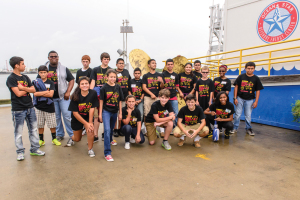
Students in the Computer-Aided Drafting & Design program at Lee College join their
instructor at the on-campus pilot plant.
Associate degree and non-credit workforce programs emphasize hands-on learning.
Behind the fence of the multimillion-dollar pilot plant at Lee College, students don hard hats and safety glasses to get hands-on training with the same equipment and systems used at plants along the Houston Ship Channel and throughout the region.
Some students are pursuing associate degrees in technical fields like drafting, instrumentation and process technology, while some are completing non-credit programs through the Center for Workforce and Community Development to earn National Center for Construction Education and Research certifications and other industry-recognized credentials.
And other students, already employed as part of the petrochemical and construction workforce, have been sent to Lee College by leaders at companies like Chevron Phillips, Covestro and Occidental Chemical for customized training designed to refresh their knowledge and help them gain new skills.
“We play a dual role in the community: helping students get an education that is going to make them employable, and providing companies with capable, up-to-date employees that they can train quickly and safely to integrate into their facility,” said Bryant Dyer, a process technology instructor who – like many Lee College faculty – brings decades of industry experience into the classroom every day.

The pilot plant at Lee College is one of several state-of-the-art learning laboratories on campus.
“If you understand how a centrifugal pump works in our distillation unit, it will work the same in any unit and you will easily adapt to any changes,” Dyer said. “Students really get a chance at Lee College to see what’s expected of them in the real world.”
The on-campus pilot plant, which recently underwent a significant $1 million upgrade to enhance its quality and efficiency, is one of several state-of-the-art learning laboratories where students have the opportunity to apply their coursework in an interactive environment. Lee College is also home to one of only six Foundation Fieldbus-certified training centers in the world, as well as labs for programmable logic controllers, and calibration and analytical tools like digital multi-meters and gas chromatography.
The expansion of the McNair Center, located along Interstate 10, created an additional 50,000 square feet of instructional space for workforce training in machining, millwrighting, pipefitting and welding – all delivered in a modern industrial environment.
Regional employers and industry advisers are integral in helping the college design program curricula and learning facilities that provide targeted training for incumbent workers, and better prepare new generations of skilled employees for a seamless and successful transition into the professional world. Available workforce services even extend to include pre-employment testing and educational consulting.
“In this region of the Texas Gulf Coast, plant expansions are expected to need 50,000 workers in the construction trades over the next 10 years, and more than 1,000 additional full-time, permanent employees thereafter as a result,” said Debi Jordan, executive director of the Center for Workforce and Community Development. “In addition, as much as 40 percent of today’s current workers will be retiring in the next 5 years, and the push to find and train a skilled workforce is on. Lee College, working in partnership with industry and the community, is developing solutions for addressing these challenges.”
And given the booming enrollment growth in the college’s technical and workforce programs and the robust pipeline of skilled workers needed by industry, facilities like the pilot plant and Foundation Fieldbus Lab are likely to remain filled to capacity for years to come.
“Lee College is as good at technical training as anyone in the country,” said Dean of Applied Sciences Layton Childress, whose career in education has spanned more than 25 years and multiple states. “Our impressive facilities only enhance the quality of the education we provide. Students and industry both really benefit.”
Lee College offers more than 100 associate degree and certificate programs, as well as non-credit workforce and community education courses, that prepare its diverse student body for advanced higher education; successful entry into the workforce; and a variety of in-demand careers. With the main campus and McNair Center located in Baytown, and a satellite center in nearby South Liberty County, the college serves a geographic area of more than 220,000 residents that includes 14 independent school districts. To learn more, visit www.lee.edu





